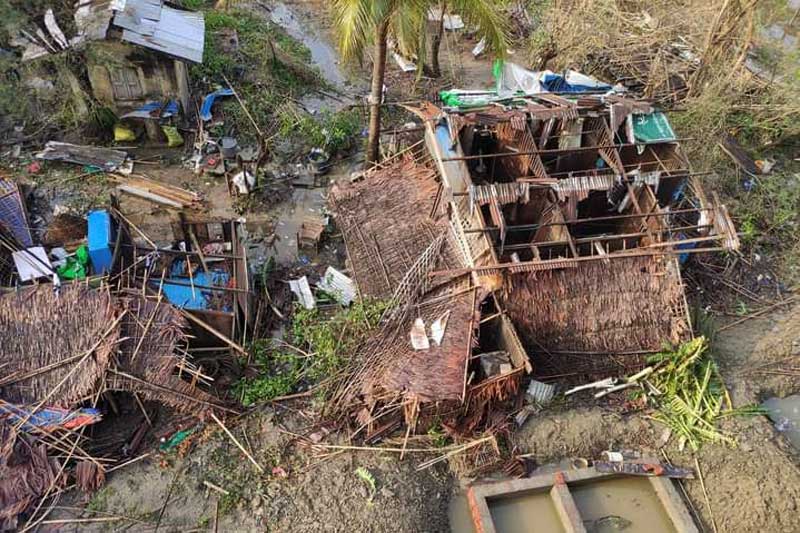- Motorbike spare part prices skyrocket in Arakan State amid tighter traffic rules
- Kyauktaw IDP camps struggle with inadequate latrines
- Religious freedom, interfaith harmony expand in areas controlled by AA in Arakan State
- IDPs in Kyauktaw struggle with collapsing shelters amid aid shortages
- Travel restrictions deny Arakanese youth access to higher education
Editorial: A Time for Aid
A land ever in the midst of storms, Arakan State now reels from the latest, Cyclone Mocha, which slammed into the Arakan coast on May 14. Telecommunications links have been spotty at best in the days since, leading to delays in communicating and understanding the extent of the devastation.
19 May 2023

A land ever in the midst of storms, Arakan State now reels from the latest, Cyclone Mocha, which slammed into the Arakan coast on May 14. Telecommunications links have been spotty at best in the days since, leading to delays in communicating and understanding the extent of the devastation.
What we do know is this: After Cyclone Mocha made landfall near the Arakan State capital Sittwe, Myanmar’s military regime on Monday declared all 17 Arakan State townships to be “natural disaster-affected regions” under the Natural Disaster Management Law. Hundreds have died, with casualties and hardship disproportionately affecting displaced populations including among the tens of thousands of Muslims effectively permanently displaced in and around Sittwe. We know that the structural damage is significant, at displacement camps most critically but elsewhere as well.
We know that the junta will not deliver aid in amounts that rise to meet the level of need there will be in the days, weeks and months to come. We know that the Arakan Army, to the extent that it seeks to see itself as a parallel governing force in Arakan State, lacks the international recognition necessary to truly guide and determine a large-scale and sustained humanitarian response to Cyclone Mocha.
We know that there is an international component to the response, in which many organisations may struggle ethically to work with this regime. It is critical that all parties involved do their best to overcome the torrid politics of the past two-plus years to collaborate as necessary to save the most lives possible in the aftermath of this storm. Temporary shelters have been decimated, a supply of clean drinking water will be critical in the days ahead, and food is, as ever in these situations, a concern.
There are reports of difficulties in the delivery of international aid to those in need. This is unacceptable and must change, but in the meantime it would benefit the Arakan Army/United League of Arakan to use this opportunity to establish links with international aid organisations in hopes of getting needed help to people, through official channels or otherwise.
There is no question that this moment requires competent action more than anything else. What a damning indictment it would be if this regime could not even manage to facilitate an effective response in one of the few places in Myanmar not utterly engulfed in civil war. The failed humanitarian response to 2008’s Cyclone Nargis by one of its predecessor military governments surely looms large in the minds of the current regime.
Noting that a widespread war against this junta is ongoing, DMG suggests that it would be in the generals’ best interest to effectively coordinate an influx of genuine offers for assistance. You do yourselves no favours by doing anything less; and communities affected by Cyclone Mocha in Arakan State and beyond deserve no less than your best in their hour of need.






.jpg)













